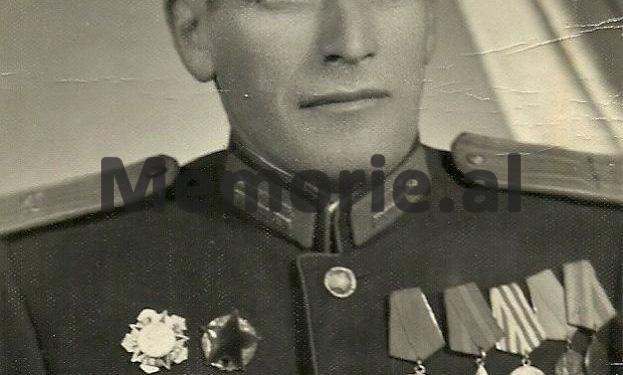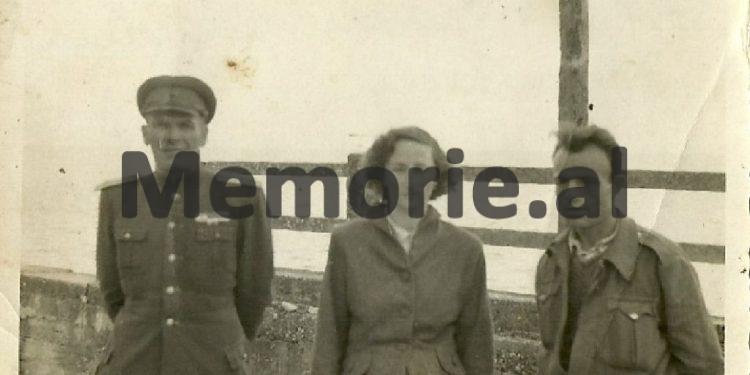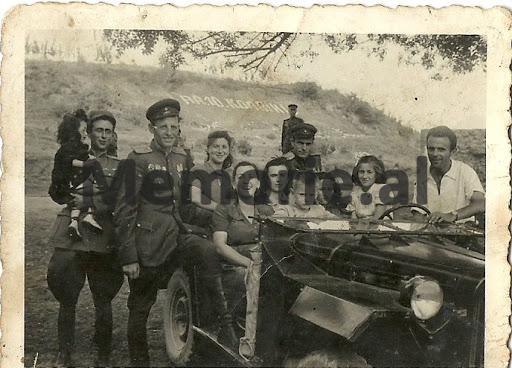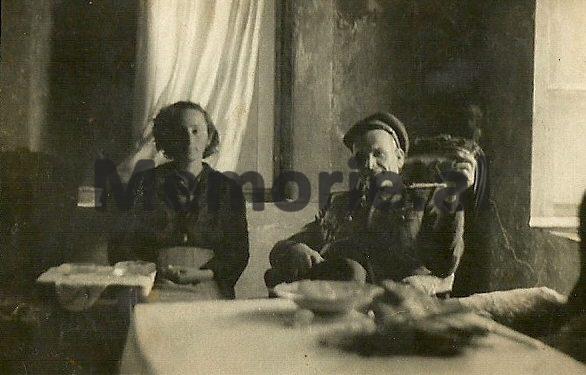Dashnor Kaloçi
Memorie.al publishes the unknown story and the pain of Colonel Haxhi Hajdar Mani, former commander of the first partisan platoon of Shkodra Region, deputy of Malësia in the People’s Assembly and Commander of the Border and Volunteer Forces of the district, I who use the ’60s take advantage of the collectivization of deep mountainous areas, characterizing it as fast. The debate at the meeting of the Plenum of the Shkodra Party Committee in the presence of Mehmet Shehu and the call the next day in the life of Enver Hoxha, where the Commander-in-Chief of the Armed Forces said: “Comrade Haxhi, we cannot open in the Shkodra Highlands, which we give the Title the opportunity to attack us through him … “. The State Security Plan for the public arrest of the rebel MP in the plenary session, the escape to the mountains and the search operations of an integral part of over 10,000 military and volunteer forces and his execution with artillery in the cave of Rrjoll, together with the friend’s son of him, who has been friends since the day he decided to leave …!
The decision of the Politburo of the Central Committee of the ALP in the late ’50s resulted in the collectivization of agriculture in the mountainous area, not only does not do and does not do better than the large mass of peasantry in all provinces of the country, but he encountered in a strong resistance even in many municipalities and honest cadres led by the senior party and the functioning of the state of that time, if in another way, raised their voice and did not agree with those tasks that would be thrown in the village as a ‘rope around the neck’. One of those who openly opposes the leadership of the senior leadership of the ALP and its creator, Enver Hoxha, was also an MP in the Shkodra Highlands, Colonel Haxhi Hajdar Mani, who is ending his military service as Commander of the Border Forces and Shkodra Region Volunteer Forces. At the end of the 60s, he raised that issue in the Party Plenum of the Shkodra district, where the Prime Minister Mehmet Shehu was delegated and then, in a plenary session of the People’s Assembly. His discussion fell like a bomb on all the deputies and it is not known even today that the scenario of the State Security for the public arrest of Colonel Haxhi Hajdari in the premises of the People’s Assembly cannot be realized? It is said that one of his close skills, a senior State Security officer, (Colonel Mit’hat Zaçe) and announced the arrest he will make in the plenary session and Haxhiu can make a secret departure from Tirana. In the late hours of that night, after taking two cars during the trip, he sat at the entrance of Baçallëk and on a secondary road of one of his houses, on the outskirts of the city of Shkodra. About three months later, on March 15, 1963, in the late hours of the night, at Haxhiu’s house in the village of Golem, you heard some taps. With a revolver in his hand, Haxhiu came out on his own to open the door. Behind her stood his close friend, who only three months ago had announced that he would leave Tirana urgently. After staying there for a few minutes to allow the house to move, they went inside. It is not known exactly what was discussed that evening in March 1963, between two old friends from the time of the War, the senior State Security soldier who came from Tirana and the owner of the house!? And to this day, 57 years have passed since that night, everything has remained covered with gentlemen. One thing is for sure: The next night, in a house of Haxhi Hajdar Manit’s house, in Golem, Shkodra, three “Jeeps” of the State Security arrive. One of the senior officers who comes down in front of them to look for the colonel, holds on the radiograph the hands coming from the Ministry of Interior, which write: “Haxhi Hajdari should be caught on bail”. But he was not there. He left the house a few minutes after the guest came from Tirana.
In 1945 he opposes communist terror!
The end of the war found Haxhi Hajdari in the city of Shkodra, as a gang commander with the rank of first captain. During 1945, when several partisan brigades, supported by the forces of the People’s Defense Division (led by Mehmet Shehu) began military cleansing operations against anti-communist forces grouped in the Shkodra Mountains, Haxhiu publicly opposed the terror he had just had. started by them, to the families who had sheltered them. In a military setting, he openly said: “We did not have the words like that. “Those houses sheltered us and kept us bread during the war.” Seeing his attitude towards the events that took place at that time in the city of Shkodra and its mountains, such as: beatings, tortures, arrests, reprisals, extrajudicial shootings and internments of large nationalist families, etc., Haxhiu was expelled from Shkodra, brought to Tirana on a complementary course for officer. After finishing that course, Haxhiu was not returned to the city of Shkodra, but was transferred to the district of Korça, appointing him battalion commander in the village of Bozhigrad.
Member of the People’s Assembly
Seeing the great popularity and absolute authority enjoyed by Haxhi Hajdari throughout the Shkodra Highlands, the senior leadership of the SNP and the Presidency of the Democratic Front, at the direct proposal of Enver Hoxha, appointed him to the list of candidates for MP of People’s Assembly, in the elections to be held in the second post-war legislature. Along with the mandate of the deputy, Haxhiu was also assigned the duty of the Commander of the Voluntary Forces in the whole Region of Shkodra, being given the rank of major. He served in that position until the end of 1954 and at that time he was released, appointing him as mayor of the locality of Postriba, the famous province where in 1945, the anti-communist uprising took place, which was the first throughout Eastern Europe. Haxhi Hajdari was released as a result of the attitudes he held towards the actions of the communist government in his area. He occasionally intervened for the injustices done to the inhabitants of his area by the local government and the Internal Affairs Branch, which made numerous arrests against the villagers of that province, accusing them of “attempted escape and agitation and propaganda against popular power”. Contrary to the Party’s directive, Haxhiu continued to respect the houses of the nationalist party throughout the Highlands, which the communist government had declared “kulaks” and “enemies of the people.” From time to time he would call and alert various villagers in those areas whom the State Security had put on the Internal Affairs Branch lists to arrest. In the position of mayor of the locality of Postriba, Haxhiu did not stay more than a year, because seeing the great popularity that he continued to enjoy in that province, the senior leadership of the ALP in Tirana and the Ministry of Defense, were forced to to call and mobilize him again as a military man. He even appointed him to the same position he had held for years: as Commander of the Voluntary Forces of the Shkodra Region, giving him the rank of lieutenant colonel. After that, Haxhiu’s authority and figure grew even more, even taking on legendary proportions. At that time, in the city and villages of Shkodra, it was said that when letters of complaint were sent to Enver Hoxha, for various problems that the area had, he did not open them at all, but said to his subordinates: “Do not bring these letters to me. me, but send it to Haxhi Hajdari, he is Enver Hoxha from Shkodra”.
Haxhiu’s reactions to collectivization
In the late 1950s, when the communist government of Tirana began collectivizing deep mountainous areas, many villagers in his constituency came and met Haxhiu, complaining about the extremely difficult economic situation in which they found themselves and about the absolute poverty that was plaguing the Highlands. At that time, the Plenum of the District Party Committee was held in the city of Shkodra, which discussed only the problems of collectivization of remote mountainous areas. In that party plenum, which was held at the “Migjeni” Theater (newly inaugurated), participated as delegates from Tirana: Prime Minister Mehmet Shehu and Adil Çarçani. Haxhi Hajdari also discussed at that meeting, who, among other things, focused on the bad economic situation that prevailed in the entire Shkodra Highlands. He suggested that collectivization should be done on a voluntary basis and not through violence and other means of pressure, as had begun. In his discussion he touched on the problem of some villagers, who had been unjustly declared kulaks, suggesting that their work be reviewed. Mehmet Shehu and two or three other discussants after him, strongly opposed Haxhiu regarding what he raised in his discussion. This caused a day later that Haxhiu was summoned to the offices of the Central Committee of the ALP in Tirana, where he was personally received by Enver Hoxha.
Discussion in the People’s Assembly
After the conversation that Haxhiu had with Enver Hoxha in his office in the Central Committee of the ALP, he was finally included in the list of very suspicious people, with whom only the Ministry of Interior already “had work”. Even after that meeting, Haxhiu continued to insist that the time had not yet come for the collectivization of deep mountainous areas and had given the floor to many well-known houses in his area, that he would raise it in the first session. of the People’s Assembly. Although he began to feel that the communist government had begun to cool off with him, Haxhiu did not back down from the word he had given to the wise men of Malësia, raising that problem to the highest instances where the word went. Given the attitude that the communist government was taking towards him, Haxhiu understood that something bad was expected to happen to him. Many of his companions and friends left him, and those who once filled his house were no longer there! Also, at the time, some of his closest associates were arrested or deported, accusing them of being “enemies of the people.” This is what happened to his close friend, Major General Hilmi Seiti, the head of the Internal Affairs Branch of the Shkodra Region who died in very suspicious circumstances (in May 1960), for which Haxhiu publicly expressed his reservations openly… After the death in mysterious circumstances of General Hilmi Seiti, in his place, Feçor Shehu was appointed as the Chairman of the Internal Branch of Shkodra Region, with whom Haxhiu had deep conflicts many years ago. Although in such circumstances, Haxhiu discussed in the People’s Assembly, raising there the problems about which he had given the floor to many men of his constituency in Malësia. In his speech, he strictly adhered to what he had said in the Plenum of the Party Committee in the city of Shkodra, as well as in the conversation with Enver Hoxha in his office in the Central Committee. Haxhiu’s discussion in the Assembly fell like a ‘bomb’ on all the deputies, who started discussing with each other about what their colleague from Shkodra was saying!
Secretly leaving Tirana!
After the end of that plenary session, Haxhiu did not approach any of his friends’ deputies in the People’s Assembly, leaving him completely alone. That afternoon, one of his close friends, a senior officer in the State Security, sent word to Haxhiu, telling him to find the opportunity to leave Tirana as soon as possible, possibly without being told. (Mit’hat Zaçe, the senior Security Officer and the man who informed Haxhiu to leave Tirana as soon as possible, years later proved that it was a plan to arrest Haxhi Hajdari in public before the deputies, a plan which even today it is not known why it was not realized). At the suggestion of his friend, that night Haxhiu secretly left Tirana and on the way to Shkodra, changed the cars he was traveling in twice. Once in Lezha and once without arriving at the Baçallëk Bridge. That late evening in January 1963, after getting out of a random car at the entrance of the city of Shkodra, Haxhiu left on foot for home. But not from the main road where he usually went …!
Who was Haxhi Hajdari?
Haxhi Hajdari was born in Golem of Shkodra in 1913, in a family with a good name in the whole area. His father, Hajdar Mani, was known as a wise and brave man, who had reconciled many bloodsheds not only in the whole Highlands, but as far as Kosovo. With the desire to resemble his father and grandfather, who had been well-known military men with ranks over their shoulders, Haxhiu grew up, who in 1938 completed a course for reserve officers in Tirana. After completing that course, he came out as an instructor for paramilitary training. Towards the end of 1942, Haxhiu went to the mountains, forming a partisan gang with villagers from the area above and below Shkodra. By decision of the Communist Circle of Shkodra, he was appointed commander of that gang, which included Ciril Pistoli as commissar (former Minister of Health in the ’60s), Mëhill Doçi (former chairman of the Executive Committee of Shkodra), Qamil Gavoçi, (one of the first communists of Shkodra), Perlat Rexhepi, (“People’s Hero”), Vasil Shanto, (“People’s Hero”), Alush Lohja, etc. From that time until the end of the war in December 1944, as a gang commander, Haxhi Hajdari took part in all the battles fought by that partisan formation in that area, thus gaining a great name and popularity throughout the inhabitants of those parts. Although he was the commander of the first partisan platoon in the entire Shkodra Region, Haxhi Hajdari was equally respected by the nationalist parish of the Shkodra Highlands, which was in open conflict with the communists. Haxhiu respected their trust, hospitality and generosity, not asking too much about communist ideas that were little known in those remote areas.
Enver: “Comrade Haxhi, we cannot make our way to Malësia, because Tito is attacking us …”
After the discussion that Haxhi Hajdari had in the Party Plenum of the Shkodra district, where he called premature the collectivization of deep mountainous areas, he was called to Tirana in a meeting with Enver Hoxha. In that meeting, which was also attended by Mehmet Shehu and Adil Çarçani, Haxhi Hajdari not only did not change the words he had said the day before at the Party Plenum in Shkodra, but he further advanced in his demands, saying Enver Hoxha that Malësia needed more investments in roads, water supply, as well as to look more favorably on its bread supply. After listening to Haxhiu until the end, Enver replied: “We do not have manpower for this work, because they are engaged in agriculture. “But even if we had, we would not engage them in building new roads, as the opening of roads in this area gives Tito a strategic opportunity to attack and occupy us.” After Enver’s words, Haxhiu replied: “I, as a deputy of Malësia, should ensure that for any eventuality I manage to mobilize every mountaineer from seven to seventy years old. And the government should provide us only with iron cement for the roads. As for Tito’s attack, make sure that he cannot pass, except in the lands of Kosovo and Kosovo is with us “. “Why do you have the power to mobilize the highlanders”, Enver Haxhiu asked. “Yes, I mobilize them both for work and for war”, Haxhiu replied, without understanding the cunning with which Enver asked him. Memorie.al
Continues tomorrow














